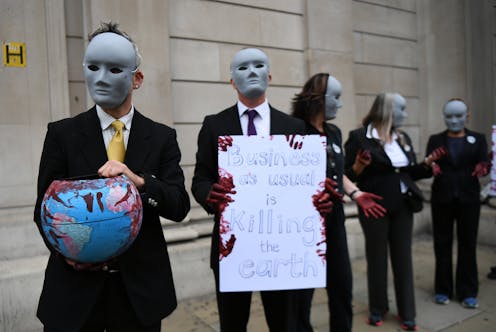How to change our collective mindset to tackle ecological crisis?
- Written by Jane Goodall, Emeritus Professor, Writing and Society Research Centre, Western Sydney University

“We have a sense that we are about to face immense upheavals,” Maja Göpel writes, and we need to find ways to tackle multiple problems at once. The context for this statement is an account of a 2019 incident staged by Extinction Rebellion protesters in a London tube station.
Review: Rethinking our World – Maja Göpel (Scribe)
Two men carrying a banner proclaiming Business as Usual = Death climbed on the roof of a train in the morning rush hour, preventing its departure and disrupting all other services on the line. Frustrated commuters pelted them with sandwiches and drink bottles, then dragged them to the ground and laid into them until the police arrived.
For Göpel, it was a definitive clash of human objectives: one side wanted to save the planet, the other wanted to get to the office.
Read more: Extinction Rebellion protesters might be annoying. But they have a point
More specifically, one side called for a radical shift in thinking, while the other clung desperately to an ingrained set of priorities. The story serves as an arresting (literally) way to illustrate a now all-too-familiar cultural dilemma. If this book has something distinctive to offer amidst the plethora of volumes devoted to ecological crisis, it is as an attempt to focus on the problem of human cognition – or, to put it more plainly, collective mind-set.
Plain speaking is essential to Göpel’s role as a public communicator in a range of national and international forums including the World Future Council, the Club of Rome, and the German Advisory Council on Global Change, for which she served as secretary-general from 2017-20.
In Rethinking Our World she aims to bring to a wider audience some key points from The Great Mindshift, her book written for policy makers in 2016.
Her aim at that time was to respond to a 2011 flagship report from the German Advisory Council on Global Change that called for “a Great Transformation,” an allusion to the title of a 1944 work by Austro-Hungarian theorist Karl Polanyi, who argued that the development of the modern state was bound up with the development of market economies: there could be no change in one without a change in the other.
The report called for “a new kind of discourse” between government and citizens. Göpel thought more needed to be said about what that meant.
Read more https://theconversation.com/how-to-change-our-collective-mindset-to-tackle-ecological-crisis-202350





